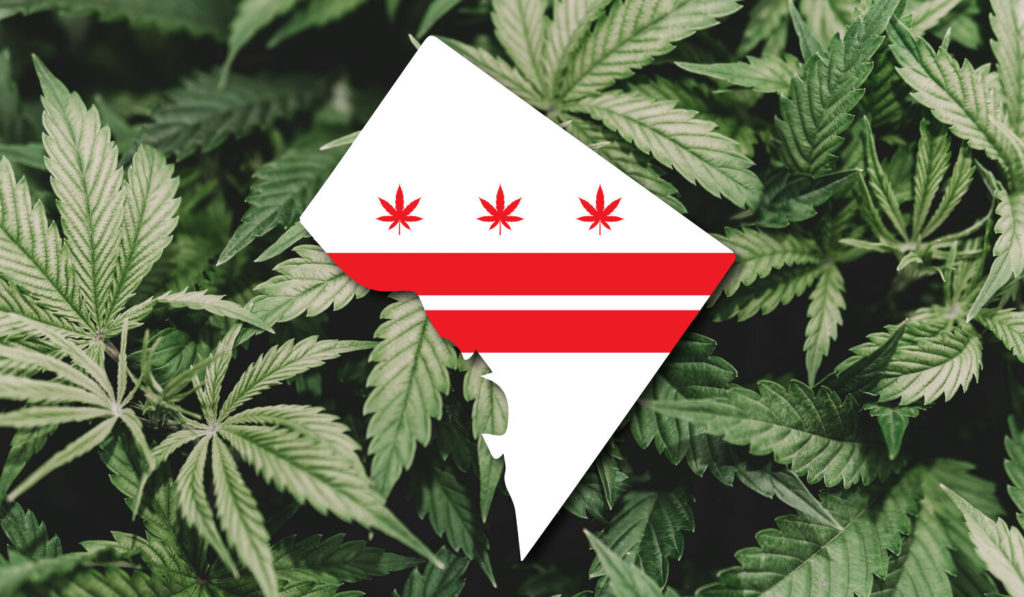Cannabis advocates have their eyes on Congress this week as House lawmakers gear up for a vote on D.C. statehood that could pave the way for the legalization of recreational cannabis sales in the District.
House Majority Leader Steny Hoyer (D-Md.) last week said he planned to bring HR 51, a bill also known as the Washington D.C. Admission Act, to a vote on Thursday, April 22. “The voice of every American citizen deserves to be heard – it’s past time that we make statehood a reality for DC,” Hoyer said in a tweet.
If passed, the legislation would admit D.C.’s eight wards as the 51st U.S. state while preserving a federal enclave that would include the White House, U.S. Capitol, Supreme Court and National Mall, and would remain under congressional control.
It would also free D.C. from further Congressional interventions designed to prevent local officials from legalizing recreational cannabis. Though District residents voted to legalize cannabis possession and home cultivation in 2014, a congressional budget rider has blocked the jurisdiction from using local tax revenue to launch a recreational market for pot.
“If D.C. was its own state, it would no longer have its budget be subject to approval by Congress,” said Justin Strekal, political director for NORML, an organization that has advocated for decriminalizing pot since the 1970s. “The rider would be null and void. It would be referencing an aspect of law that no longer is relevant.”
Congressman Andy Harris (R-Md.), a staunch opponent of legalization, routinely introduced the rider until Democrats regained control of the House in 2019. The “Harris rider” was then picked up by Senate Republicans. It’s still unclear whether it will make it into this year’s budget bill.
Strekal said the Harris rider has resulted in the proliferation of a “gray market” in D.C. where businesses use a loophole in local laws to “gift” cannabis. But without the typical consumer guarantees of a regulated industry, that market can be unpredictable.
“Cannabis consumers deserve certainty in the product that they’re getting, and to be confident that the products they’re getting are accurately labeled and tested through verified testing procedures,” he said. “That is not possible under the status quo in the District of Columbia.”
Last summer, the House approved a similar statehood bill in a landmark 232-180 vote, marking significant progress in the District’s decades-long fight for equal representation. The bill later stalled in the Senate, then controlled by Republicans.
Democrats and Republicans are now evenly split in the Upper Chamber, but a statehood bill still faces long odds –– it would need to muster approval from at least 60 senators to defeat a Republican filibuster. As of Monday, the Senate companion bill for D.C. statehood had a record 44 co-sponsors.
That’s well below the required 60. Still, the movement for D.C. statehood has recently gained unprecedented momentum as prominent Democrats (and celebrities like Alyssa Milano) have rallied behind the cause.
Support for the issue also appears to be growing across the country. In a recent poll by Data For Progress, a progressive think tank, 54% of respondents said they would support granting D.C. residents statehood “so they can elect voting Senators and Representatives.” That’s up from just 35% in 2019.
Earlier this month, Congresswoman Eleanor Holmes Norton, D.C.’s longtime non-voting delegate in the House, told The Outlaw Report she’s hopeful about statehood’s prospects.
“The reason that we have this mounting support is because people have found out for the first time what they did not know about their own nation’s capital,” said Norton, who introduced H.R. 51 this year and last. “Many thought we had the same rights they had.”
Norton said legalizing recreational cannabis sales could boost the District’s tax revenue at a time when city coffers have taken a hit from the coronavirus pandemic.
“There’s no reason why states should be allowed to commercialize marijuana and DC should not,” she said. “I think with control of both houses and the presidency, this is the year to change that.”
Norton testified on her statehood bill before the House Rules Committee on Tuesday. “D.C. residents deserve full voting representation in the Senate and the House and complete control over their local affairs,” she said in her testimony. “They deserve statehood.”

